Feed aggregator
Boo Cat

A bonus video for Christmas Eve! We have here an amazing new music video by the band Chaunter [1] dropped today and it has an actual furry [2]in it! So much better than some band renting a horrible mascot costume. [1] https://twitter.com/chaunterband [2] http://href=
View Video
TigerTails Radio Season 11 Episode 35
Bilby

Well, I have cute overload now. "Threatened daily by the deadly residents and harsh environment of Australia’s Outback, a lonesome Bilby finds himself an unwitting protector, and unexpected friend, to a helpless (and quite adorable) baby bird. BILBY is directed by Liron Topaz, Pierre Perifel and JP Sans; produced by Jeff Hermann and Kelly Cooney Cilella."
View Video
Afternoon Delight
IDW has a new anthology comic sure to catch the interest of TV animation watchers — and furry fans: Disney Afternoon Giant. According to them, “It’s the first issue of a brand-new series featuring stories from your favorite Disney Afternoon shows! It’s a blast from the past in the present as we feature classic DuckTales, Chip ‘n’ Dale Rescue Rangers, and Darkwing Duck stories, all together in one place for the first time!” The first issue features stories by Warren Spector and Ian Brill, with art by Leonel Castellani, Jose Massaroli, James Silvani, Jake Myler, and Braden Lamb.
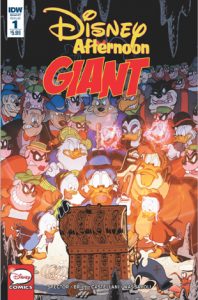
image c. 2018 IDW Publishing
What The Flix? - The Christmas Chronicles - Patreon: www.patreon.com/thedraggetshow www.drag…
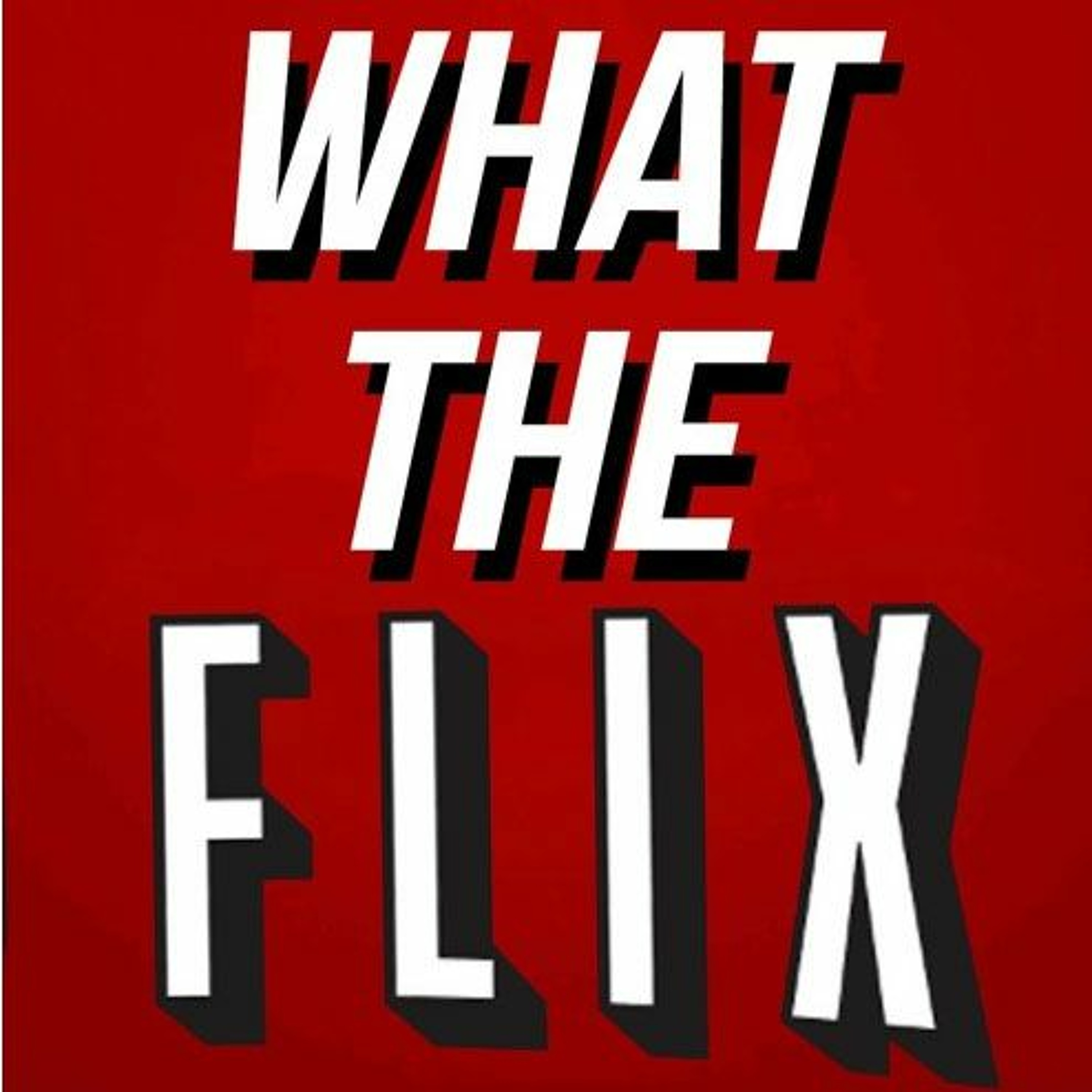
Patreon: www.patreon.com/thedraggetshow www.draggetshow.com Be sure to check our website for all Things Dragget Show! Podcasts, videos, merch and more! Also, don't forget we stream the D&D sessions Sunday at 7pm Central on YouTube! YouTube: www.youtube.com/user/DraggetShow What The Flix? - The Christmas Chronicles - Patreon: www.patreon.com/thedraggetshow www.drag…
That’s A Lotta Bull, Lass
A classic folk tale comes to us in the form of a new full-color graphic novel series courtesy of Image Comics. “The sibling writer/artist duo of Cat Seaton and Kit Seaton (AFAR) team up for Norroway, Book 1: The Black Bull of Norroway, the first in an original graphic novel series based on the Scottish tale of the same name. Sibylla had always craved adventure, but she never guessed it would show up at her door in the form of a giant, magical bull. Who knew a prophecy could be so literal?” The first book is available in trade paperback.
image c. 2018 Image Comics
Save the Fuzzlies!
Animation World Network let us know about another new animated series on its way to Nick Jr. “Nickelodeon has set the premiere of their brand-new animated preschool series, Abby Hatcher, created and produced by Spin Master Entertainment… Abby Hatcher tells the story of a little girl with a big heart who helps her friends, the amazing and quirky Fuzzly creatures, fix their mishaps, learn from their mistakes and negotiate their emotions… Abby is an eternally optimistic, kind-hearted seven-year-old girl who loves to lend a helping hand to others and accepts everyone–no matter how different they are. In Abby’s world, humans coexist with Fuzzlies, incredible creatures that each have their own unique abilities that make them special, and Abby’s parents’ hotel is home to many. Together with her best Fuzzly friend Bozzly, Abby goes on wild adventures to fix Fuzzly mishaps and help them in any way she can.” Spin Master Entertainment are the folks who previously gave us PAW Patrol.
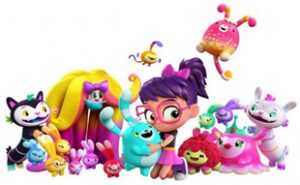
image c. 2018 Spin Master Entertainment
Dwuff [16 Dec 2018] - South Afrifur Pawdcast
Don’t Let the Cat-Fish Bite
And found at a local bookstore: Snazzy Cat Capers, a new adventure novel series for middle-school readers written by Deanna Kent. “Life is short. Diamonds are fur-ever. Internationally famous cat burglar Ophelia von Hairball V adores jewels. The only thing she loves more is a challenge. She’s never met a safe she couldn’t crack. Now the Furry Feline Burglary Institute (FFBI) offers her the ultimate caper: Steal the giant Himalayan diamond and win their top award! There’s a catch! The FFBI sends an enthusiastic inventor to help Ophelia… but this cat works alone, and Oscar Fishgerald Gold smells fishy. Can the smartest, stealthiest, and snazziest of cats learn to work with a fintastic sidekick and prove she’s still the world’s most purr-fect burglar?” Check out the offical SCC web site for more, including a preview of the 2nd book, The Fast and the Furriest.
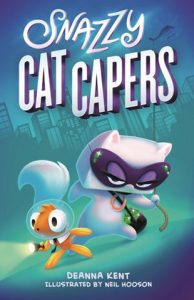
image c. 2018 Imprint
Otters in Space II: Jupiter, Deadly, by Mary E. Lowd
 After her initial adventure in Otter Space, Kipper just wants to go home... Unfortunately, she might have to save the galaxy first.Jupiter, Deadly is the second book in the Otters in Space universe. It follows the continuing journey of an ordinary tabby cat with the extraordinary ability to find trouble. Kipper and her otter friends are dragged into a mysterious battle centered around Jupiter while, back on Earth, her family and her best dog pal Trudith are embroiled in a political campaign that could mean everything for the cats of Earth.From page one, Kipper and Trudith have their work cut out for them. Kipper rushes to rescue a secret space cat colony from maybe the coolest alien invaders ever, and Trudith gets to deal with Kipper's siblings, their drama, and the confusing and convoluted world of politics, romance, and family dynamics.Otters in Space II brought all the things I loved about the first book and made them even shinier. I found Kipper a great deal more likable as her arc continued to blossom, and the action/adventure element was dialed up to eleven in this one. The writing is sharp and simple enough for any audience, and the story is delightful from start to finish.It is a multi-POV book, and in places the heads hop more than I'm used to, but the switches were done smoothly enough that after an initial pause, they didn't distract me or detract from the reading experience. I found Jupiter, Deadly to be fun, playful, exciting, heartwarming, and very satisfying. My tiny quibble with the ending was that a few things that got summed up rather than experienced on the page, but Otters in Space II definitely left me wanting more. As soon as possible.I'd recommend it for anyone who likes a good space romp, scifi, space opera, otters, and/or just a heartwarming and fun family-friendly read.
After her initial adventure in Otter Space, Kipper just wants to go home... Unfortunately, she might have to save the galaxy first.Jupiter, Deadly is the second book in the Otters in Space universe. It follows the continuing journey of an ordinary tabby cat with the extraordinary ability to find trouble. Kipper and her otter friends are dragged into a mysterious battle centered around Jupiter while, back on Earth, her family and her best dog pal Trudith are embroiled in a political campaign that could mean everything for the cats of Earth.From page one, Kipper and Trudith have their work cut out for them. Kipper rushes to rescue a secret space cat colony from maybe the coolest alien invaders ever, and Trudith gets to deal with Kipper's siblings, their drama, and the confusing and convoluted world of politics, romance, and family dynamics.Otters in Space II brought all the things I loved about the first book and made them even shinier. I found Kipper a great deal more likable as her arc continued to blossom, and the action/adventure element was dialed up to eleven in this one. The writing is sharp and simple enough for any audience, and the story is delightful from start to finish.It is a multi-POV book, and in places the heads hop more than I'm used to, but the switches were done smoothly enough that after an initial pause, they didn't distract me or detract from the reading experience. I found Jupiter, Deadly to be fun, playful, exciting, heartwarming, and very satisfying. My tiny quibble with the ending was that a few things that got summed up rather than experienced on the page, but Otters in Space II definitely left me wanting more. As soon as possible.I'd recommend it for anyone who likes a good space romp, scifi, space opera, otters, and/or just a heartwarming and fun family-friendly read. Once a Dog, by Shaune Lafferty Webb
 When a naïve puppy’s favorite human goes missing, he decides to leave the safety of his family pen to track him down and bring him home. However, this seemingly simple decision sets in motion a whirlwind-paced plot full of intrigue, colorful worlds, and a delightful cast of characters. Shaune Lafferty Webb’s Once a Dog begins with its focus on Jessie B. Collie. He’s young and completely unfamiliar with the world around him. Terms that humans have ready names for are described in a very simple way (a personal favorite example is the lack of the word "cat," instead opting for the much more appropriate "scratch-and-spit"). His world is small and simple, and he is content. Much like the classic narrative from The Wizard of Oz, this sepia-toned farmscape soon gets blown away, leaving Jessie to try and find his way through a fantastical world full of new friends, new rules, and the realization that not everyone is as friendly as they seem to be. Overall, Once a Dog is well written. The settings are wonderfully imagined and fully realized, and that really helps bring this narrative to life. Additionally, the cover art by Lew Viergacht is absolutely wonderful. One minor gripe I had while reading this book was with the pacing. While the characters that Jessie B. Collie meets along his journey definitely have their own quirks, and are each memorable, the speed at which the narrative is moving left me craving a bit more development. What this pace does allow for, though, is to let the reader watch Jessie grow and mature as a character. The importance of life, and the gaining of experiences, is a running theme that, as an older reader, I can definitely appreciate. No matter what your age is (and even if you’re more of a cat person), you can find something to enjoy about Once a Dog. It’s a fun, occasionally poignant adventure that called back to a few of the classic Don Bluth animations I enjoyed as a kid. It’s definitely worth a read!
When a naïve puppy’s favorite human goes missing, he decides to leave the safety of his family pen to track him down and bring him home. However, this seemingly simple decision sets in motion a whirlwind-paced plot full of intrigue, colorful worlds, and a delightful cast of characters. Shaune Lafferty Webb’s Once a Dog begins with its focus on Jessie B. Collie. He’s young and completely unfamiliar with the world around him. Terms that humans have ready names for are described in a very simple way (a personal favorite example is the lack of the word "cat," instead opting for the much more appropriate "scratch-and-spit"). His world is small and simple, and he is content. Much like the classic narrative from The Wizard of Oz, this sepia-toned farmscape soon gets blown away, leaving Jessie to try and find his way through a fantastical world full of new friends, new rules, and the realization that not everyone is as friendly as they seem to be. Overall, Once a Dog is well written. The settings are wonderfully imagined and fully realized, and that really helps bring this narrative to life. Additionally, the cover art by Lew Viergacht is absolutely wonderful. One minor gripe I had while reading this book was with the pacing. While the characters that Jessie B. Collie meets along his journey definitely have their own quirks, and are each memorable, the speed at which the narrative is moving left me craving a bit more development. What this pace does allow for, though, is to let the reader watch Jessie grow and mature as a character. The importance of life, and the gaining of experiences, is a running theme that, as an older reader, I can definitely appreciate. No matter what your age is (and even if you’re more of a cat person), you can find something to enjoy about Once a Dog. It’s a fun, occasionally poignant adventure that called back to a few of the classic Don Bluth animations I enjoyed as a kid. It’s definitely worth a read! Jingle Egg Shells, Jingle Egg Shells…
A perfect seasonal item, now on the bookshelves: It’s The Christmasaurus, a new novel for young readers written by singer/songwriter and YouTube celebrity Tom Fletcher. “Once upon a time–long, long ago, when dinosaurs roamed the Earth–an egg rolled away from its mother and landed in the ocean, where it froze solid and stayed peacefully for thousands of years. Then one day Santa and his elves discover the frozen egg, and Santa sits on it to see if it will hatch. But he can’t guess what’s inside. . . a dinosaur! Meanwhile, a young boy named William Trundle has only ever wished for one thing for Christmas: A dinosaur! So when Santa accidentally gives William the real Christmasaurus instead of a stuffed replica, it’s the Best Christmas Ever! Until an evil man known as the Hunter decides a dinosaur will be the perfect addition to his collection…” With illustrations by Shane Devries, The Christmasaurus is available now in hardcover from Penguin Books/Random House.
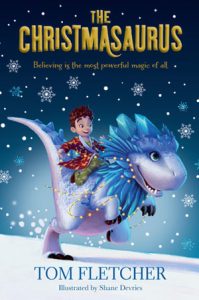
image c. 2018 Penguin Books
FA 108 Toxic Popularity - We discuss the ethics of zoophilia, toxic popularity, and becoming more dominant in bed.
On this week’s show we open with a discussion of the sexualization of animals, and the various forms such sexualization can take (zoophilia, bestiality, zoosadism). Guest host Klik Wolf joins us to discuss our main topic, toxic popularity — we talk about how the desire to become popular can turn some well-meaning furs into people they don’t want to be. We close with advice about becoming more dominant in bed.
Viro: Welcome back to Feral Attraction! Joining me as a guest host this week is Klik Wolf. Klik, why don’t you take a moment to introduce yourself?
Klik: Hello, I'm klik Wolf. I'm an aspiring indie game dev and adult performer and I've been in the furry fandom for over 8 years but have just recently started getting involved in the community.
Introduction topic
What forms can sexualization of animals take?
Zoophilia
Taking a sexual interest in animals
Fantasizing about animals or animal parts in a sexual way
May include feral art / roleplay
Bestiality
Having sexual contact with an animal
Zoosadism
Torturing an animal for the purpose of sexual gratification
What are the ethics of having a sexual interest in animals?
Should we be tolerant of non-offending zoophiles?
What are the ethics of thought crimes?
What is the legality?
Sexual contact with animals is illegal in many jurisdictions, including most of the United States
Hawaii, Kentucky, Nevada, New Mexico, Texas, Vermont, West Virginia and Wyoming are the only states that lack explicit anti-bestiality laws
Toxic Popularity
What is the purpose of fandom?
The furry fandom was created to be a place where anyone could be accepted and supported, a fandom where people could forget about shallow ideas like popularity and enjoy the company of others without worrying about social pretenses. Unfortunately, many furs don't feel like this is the case.
How does popularity in the fandom actually work?
What tends to get social media attention
Often, things that are quite impersonal
Positivity
Memes
Relatable sentiments
Fursuit pics
Humor/Puns
Smut
Porn
What tends to make people avoid you
Often, things that are quite personal
Drama
Negativity
Contrarianism
(unless you’re popular specifically for being a troll)
Neediness
Desperation
Awkwardness
Inappropriateness
Cliques
Many groups of friends in the fandom are essentially by invitation only
It can be frustrating to attempt to befriend someone who is part of a clique
The value of a clique lies in there being an “outgroup” of people who supposedly “aren’t worthy” of being in
You do not need to internalize the message that you “aren’t worthy” just because a particular clique seems closed off to you
What are the downsides of popularity?
Haters
Some people will be envious of you and will take a dislike to you, or even work to sabotage you
Extra scrutiny
Lots of eyes and ears on you means people notice your mistakes (microaggressions, moments of weakness/anger, etc.)
Tone policing
Can feel like you need to wear a mask, not be “human”
Prejudice
People who know you by reputation can form first impressions of you without you ever actually meeting them
Can create a sense of paranoia
Emotional bandwidth
Fan interactions / fan service can become extremely draining and allow little time/energy for personal/intimate relationships
How do you want to show up in the fandom?
Why do you want to be popular?
Attention?
Sexual partner selection?
Influence?
Legacy?
Power?
What would popularity actually bring you?
Weigh pros/cons
How much of your “true self” are you willing to lose?
How can you show up in a likable but authentic way?
How else can you create the emotions you’re after?
Who do you really want to be well liked by?
Feedback
“I just found your podcasts the other day through Culturally F’d. You guys do a wonderful service for humanity and the anthro community. Life’s been fucking dark so I look forward to the new episodes and I’m speechless for how this fandom is matured. Without a doubt, thank you for everything you do, seriously. In just about 6 months I returned to being a furry after like 10 years, and everywhere I look I see so much to fucking love in this community. Especially resistance regaining ground against empire. Seems so unreal.” - Daisy
Question(s)
What is the first step to going from being a submissive to becoming a dominant in bed? After five years, my boyfriend wants to have me dominate and take control. I’m a little nervous and really unsure of how to start to ease into the role without becoming overwhelmed.
Received via Contact Form (name withheld)
FA 023 BDSM Roles Demystified: https://www.feralattraction.com/shownotes/fa023
Learning to be more dominant in bed advice column:
https://www.feralattraction.com/advice/learning-to-be-more-dominant-in-bed
Closer
Contact info
Contact Viro:
Telegram: t.me/viroscicollie
Twitter: twitter.com/viroscicollie
Contact Klik:
Telegram: t.me/Klik2097
Twitter: https://twitter.com/klik2097 (warning: 18+ NSFW)
Feral Attraction Twitter:
Feral Attraction Contact Page:
Coaching Services now available!
As our audience has grown, many of our listeners and advice column readers have asked to speak with Viro in a one-on-one setting so as to get help with resolving relationship issues or overcoming stumbling blocks that can trip us up on life's journey. Until now, it was not possible to offer such one-on-one attention, simply because of time constraints. Fortunately, Viro is now offering this kind of individualized attention as a service!
For more information, visit: feralattraction.com/coaching
Other business
Patreon
Joel Kreissman is a published author of anthropomorphic science-fiction in his Para-Imperium universe. His first novel, The Pride of Parahumans, was published with Thurston Howl publications in 2017 and he has more free stories on his blog at https://paraimperium.wordpress.com/
FA 108 Toxic Popularity - We discuss the ethics of zoophilia, toxic popularity, and becoming more dominant in bed.
